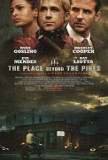Place Beyond the Pines, The (United States, 2012)
March 28, 2013
By turns powerful and frustrating, The Place Beyond the Pines is a three act tale about the sins of the fathers being visited upon the sons. It uses coincidence to emphasize consequence and ably applies karmic lifestyle interpretation to the text. The film's narrative offers three separate but interrelated stories but does so in a straightforward manner, not requiring the viewer to piece together a cinematic jigsaw puzzle. Unfortunately, instead of getting stronger as the running time mounts, The Place Beyond the Pines heads in the opposite direction with the somewhat meandering final act being substantially weaker than the two to precede it. The end result is that the movie feels longer than its already significant 140-minute length and the ending is something of an anticlimax.
The movie lacks the verisimilitude of Cianfrance's Blue Valentine, but it's not as grim, either. That isn't to imply The Place Beyond the Pines could be characterized as upbeat. In fact, it spends time wallowing in darkness and corruption, but at least there's an element of hope to the way things turn out. Strong acting, at least during the first two acts, strengthens the film's foundation and makes it easier to accept the somewhat jarring change of main character when the narrative shifts from Chapter One to Chapter Two. The leads in the third segment, however, aren't up to the level of their predecessors and this is yet another reason why The Place Beyond the Pines seems to be gasping for breath as it staggers across the finish line.
Motorcycle daredevil Luke Glanton (Ryan Gosling) finds his rootless world turned upside down when he learns that he fathered a child as a result of a brief affair with a Schenectady, New York waitress named Romina (Eva Mendes). Fatherhood is important to Luke; he wants to be a part of his young son's life and care for him, but he doesn't know how. It doesn't help that he is unemployed and cursed with a limited skill set. He gets a job working for a local mechanic (Ben Mendelshohn) who teaches him that there are easier and more lucrative ways to get money than tinkering under the hoods of the occasional customer's automobile.
Officer Avery Cross (Bradley Cooper) is an ambitious, strait-laced cop who discovers how difficult it can be to carry the label of "hero" without besmirching it. A law-school graduate who joined the Schenectady force to fight injustice on the front lines, he is given a dispiriting lesson in the reality of police work by a network of corrupt cops. His wife, Jennifer (Rose Byrne), resents the danger to his life and his own conscience refuses to let him take the easy and lucrative way out.
Two high school kids, Jason (Dane DeHaan) and AJ (Emory Cohen) form an unlikely friendship based on Jason's drug-dealer contacts and AJ's ability to get cash. The relationship between the two follows a familiar trajectory: the outsider doing what he can to remain in a popular kid's shadow and reap the rewards resulting from such proximity. But Jason and AJ share a secret of which neither is aware.
The first two segments of The Place Beyond the Pines are dramatically compelling and narratively unpredictable. There's pathos in the way Luke attempts to cope with the sudden revelation that he has a son and in the desperation that drives him to take risks to provide the child with a better upbringing than he had. ("My father was never around and look how I turned out.") Likewise, Avery is a well-drawn character who copes with issues rarely addressed in movies. When cops shoot someone in the line of duty and are publically lauded for it, how do they process it? In Avery's case, the reaction is believable. Unfortunately, the strengths of the production's first two-thirds are diluted in the final act. The lead characters in this portion of the movie are flat, the story hinges on a transparent contrivance, and the pace is sluggish. There's a cyclical sense of balance and closure in the way The Place Beyond the Pines ends but Cianfrance is unable to maintain the same high level from start to finish.
The camerawork is dominated by handheld shots but they are less distracting and motion sickness-inducing than in some productions. Cianfrance has found the trick to pull the audience into the drama without causing nausea. The car chase, which is seen entirely through the front window of a police cruiser and accomplished in one seemingly unbroken take, is effective. Also noteworthy is the opening shot where the camera follows Luke as he gets ready for and executes his motorcycle gig. Although seemingly simple, the underlying complexity involves either replacing Ryan Gosling with a double or putting the actor in a position to do a difficult stunt while the cameras are rolling.
Although The Place Beyond the Pines is not an unqualified success, when Cianfrance stumbles, it's because he's reaching for greatness - a quality infinitely preferable than the opposite, which is where far too many motion pictures become mired. The characters are interesting and capture our sympathy and, although there are things to criticize about the final forty-five minutes, it brings the saga to a conclusion. There's a lot to like about The Place Beyond the Pines even if it isn't the feel-good movie of the spring.
Place Beyond the Pines, The (United States, 2012)
Cast: Ryan Gosling, Bradley Cooper, Eva Mendes, Rose Byrne, Dane DeHaan, Emory Cohen, Ray Liotta, Bruce Greenwood, Ben Mendelsohn
Screenplay: Derek Cianfrance, Ben Coccio, Darius Marder
Cinematography: Sean Bobbitt
Music: Mike Patton
U.S. Distributor: Focus Features
U.S. Release Date: 2013-04-29
MPAA Rating: "R" (Violence, Profanity, Sexual Content, Drugs)
Genre: DRAMA
Subtitles: none
Theatrical Aspect Ratio: 2.35:1

Comments